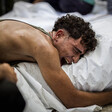The Electronic Intifada 16 April 2019

Protests were held in Gaza recently over how the Palestinian Authority has stopped paying allowances to many prisoners; one prisoner, Faris Baroud, died behind Israeli bars soon after his allowance had been stopped.
APA imagesWalaa Abu al-Qumsan has been forced to drop out of university.
Paying the 21-year-old’s fees has proven impossible over the past few months because her family stopped receiving an allowance from the Palestinian Authority.
Worth approximately $700 per month, the allowance had been granted after Walaa’s father Yousif was killed by Israeli troops invading the Jabaliya refugee camp in northern Gaza 17 years ago.
Walaa is angry with Mahmoud Abbas, the PA’s leader, for halting the allowance. She was hoping to soon complete an Arabic language degree in the Islamic University of Gaza. She heard that the allowance was dropped just as she was about to enroll for her final semester.
“Our lives are really dependent on this allowance,” she said. “But it seems that Abbas doesn’t care about our lives.”
Her 19-year-old sister Nour faces the same predicament. Nour had been studying to become a medical secretary at Gaza’s University College of Applied Sciences. She, too, has no choice but to abandon her studies.
“Whether or not I realize my dream and graduate from college is in the hands of Abbas,” Nour said. “I wanted to graduate and start looking for a job to support my family. Since the allowance was stopped, we can’t pay the fees or even the costs of travel to the university.”
The family appears to have been punished for its political affiliations. Yousif Abu al-Qumsan was a member of the Qassam Brigades, Hamas’ armed wing.
Right, not charity
In February, the PA stopped paying allowances to 1,700 families of people who had been killed by Israel.
The measure appears to mainly target the families of fighters with Hamas and Islamic Jihad. Both of those organizations are considered rivals to Fatah, which Abbas leads.
“The allowance is not charity, it is a right,” said Yousif’s son Ahmad, now aged 29. He added that he had “no idea” why Abbas has decided to punish the families of people killed by Israel’s forces.
My own extended family has been affected by the measures.
In 2003, my cousin Ramiz al-Talmas, a member of the Qassam Brigades, was killed during an Israeli incursion in northern Gaza. He was the only son of my aunt Hania.
The allowances paid to families of people killed by Israel have varied. Factors taken into consideration when setting them have included the size of a victim’s family, the victim’s marital status and the salary which the victim was paid while alive.
In Ramiz’s case, his family was paid a monthly allowance of about $600.
“My son sacrificed his life for this country,” Hania told me. “Now the president [Abbas] has rewarded him by cutting the allowance that supported his four children.”
A simple dream, gone
Allowances that the Palestinian Authority was paying to people jailed by Israel have similarly been halted.
The cuts affect a total of about 770 former prisoners and 133 others who are still in jail.
They have been implemented against the backdrop of efforts by Israel to deprive Palestinians of funds. Israel had been refusing to hand over tax revenues that it collects on behalf of the PA. One reason stated by Israel for withholding the money was that the PA was making payments to prisoners.
Earlier this year, the PA stopped paying an allowance to Faris Baroud, who has been in jail since 1991 for killing an Israeli and injuring three others.
Baroud, from Gaza City, died in prison shortly after the allowance was stopped. The measure means that his family has been punished by both Israel and the PA.
For more than a decade, Israel denied Faris Baroud’s mother permission to visit him, citing “security” as a pretext. She died in 2017.
Allowances paid to people wounded by Israel have also been stopped at Abbas’ behest.
Ibrahim Salha, a member of Islamic Jihad, was shot in the back by Israeli forces during a 2006 assault on Jabaliya refugee camp. Now aged 30, his injuries have left him unable to find work. He was receiving about $500 per month from the PA until the allowance was stopped.
“I can’t believe that this has happened,” he said. “I was getting an allowance for 13 years and suddenly it was cut.”
Salha was hoping to get married in the near future. The ending of his allowance means that he cannot afford to do so.
“I can’t lead my life normally,” he said. “Even my simple dream of getting married is now gone.”
Hamza Abu Eltarabesh is a journalist from Gaza.





